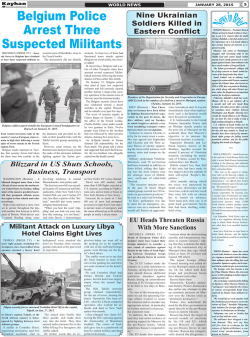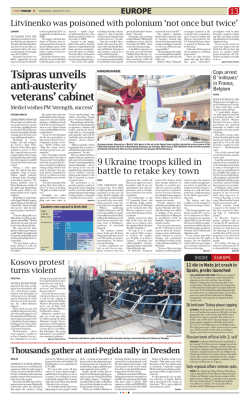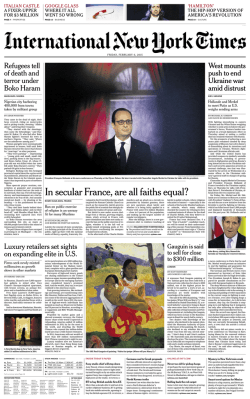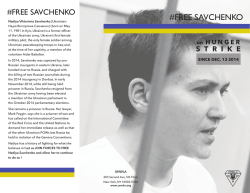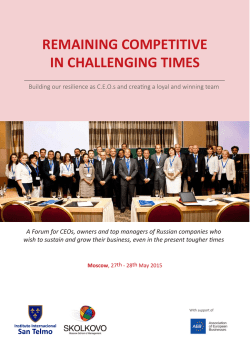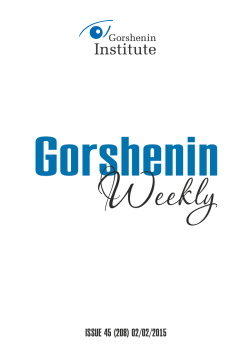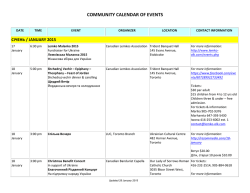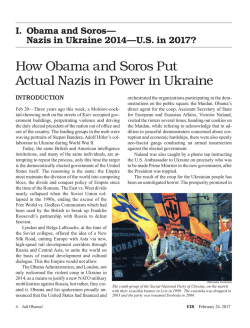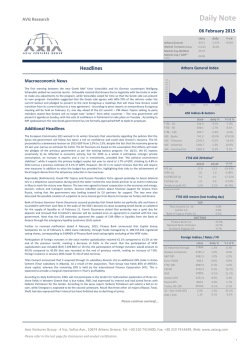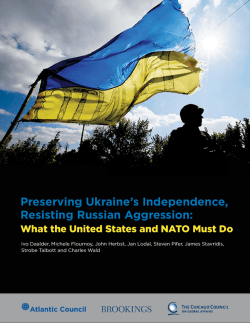
EU,ExceptGreece,PushesRussiaSanctions
P2JW028000-2-A00600-1--------XA CMYK Composite CL,CN,CX,DL,DM,DX,EE,EU,FL,HO,KC,MW,NC,NE,NY,PH,PN,RM,SA,SC,SL,SW,TU,WB,WE BG,BM,BP,CC,CH,CK,CP,CT,DN,DR,FW,HL,HW,KS,LA,LG,LK,MI,ML,NM,PA,PI,PV,TD,TS,UT,WO A6 | Wednesday, January 28, 2015 * * THE WALL STREET JOURNAL. WORLD NEWS EU, Except Greece, Pushes Russia Sanctions Europe Blasts Kremlin for Ukraine Violence, but Spat With New Greek Government Signals Fresh Rift Over Confronting Putin BY LAURENCE NORMAN New Cabinet In Athens Heralds Austerity Clash Associated Press BRUSSELS—European Union leaders censured Russia’s actions in Ukraine and asked the bloc’s foreign ministers to work up new options for sanctions, but Greece’s new government signaled it might resist fresh pressure on Moscow. EU leaders, in a communiqué, cited Russia’s “continued and growing support” for pro-Moscow rebels in eastern Ukraine, saying it “underlined Russia’s responsibility” for the recent surge in violence. Ahead of an emergency meeting of EU foreign ministers on Thursday called to discuss the worsening conflict in Ukraine, the leaders urged Russia to quickly move to ensure that separatists respect the peace and cease-fire accords signed in September in Minsk. “In view of the worsening situation, we ask [foreign ministers] to assess the situation and to consider any appropriate action, in particular on further restrictive measures,” they said. Greece’s new government, though, jumped into an early diplomatic spat with Brussels over the statement, which it said it hadn’t approved. The statement “was circulated without having followed the correct procedure for ensuring the consent of member states and, in particular, without ensuring Greece’s consent,” said Dimitrios Tzanakopolous, a senior aide to new Greek Prime Minister Alexis Tsipras. The disagreement suggests the election victory of Mr. Tsipras’s left-wing Syriza party on Sunday could deepen divides within the bloc over how hard to press the Kremlin. It also hints that Mr. Tsipras could prove to be a political thorn in the side of the EU beyond his campaign against European-imposed austerity policies and in favor of further debt relief that helped bring him into office. Greece can’t be ignored if it chooses to oppose further EU sanctions against Russia, since Municipal workers on Tuesday carry a coffin holding the body of a man killed in a weekend attack in the eastern Ukrainian city of Mariupol. any penalties require a unanimous decision from all 28 governments. However, in the give and take of EU politics, the government of a small country is usually required to give ground in many other areas to achieve its priorities. The EU has already introduced restrictions on trade, defense and energy links with Russia and has targeted dozens of Russian officials and separatist leaders with an asset freeze and travel ban. Among the further steps the bloc could take is widening the net of companies frozen out of Western financial markets to more state-run firms or to private companies. They could also ban exports of technology related to the gas industry, on top of a similar ban already in place against Russia’s oil sector. EU diplomats say the bloc is unlikely to adopt any fresh restrictions at the Thursday meeting of ministers but that work would begin then on developing options for EU leaders at their next summit on Feb. 12-13. Greek officials said the European Council, the body that represents member states, had ignored their criticisms of the communiqué. One Greek official said a senior aide to Mr. Tsipras had told European Council President Donald Tusk’s office early Tuesday that Athens needed more time before agreeing to it. The person said the EU went ahead regardless. Mr. Tusk’s spokesman hit back at the Greek claims in emailed remarks. He said the European Council consulted with all member states, including a representative of the new Greek government, before issuing the statement. “It was our understanding that the statement had been agreed by all [Monday] evening. Greece didn’t object to the draft statement, either in the phone call between President Tusk and Prime Minister Tsipras nor in the communication with the new Greek Sherpa,” said the spokesman, Preben Aamann, referring to a senior Greek diplomat. Mr. Aamann said Mr. Tusk’s office offered to add a footnote to the statement explaining that Greece wasn’t covered by it, but Athens rejected that idea. Mr. Tsipras has in the past lashed out at EU sanctions on Russia, saying they did nothing to resolve the Ukraine conflict. He has made at least two visits to Moscow over the past two years, receiving a warm welcome from senior Russian lawmakers. On his last trip in May 2014, the official Rossiskaya Gazeta newspaper published an interview with him where he said the sanctions “are harming Europe.” Tuesday’s EU statement is evidence of an abrupt mood change in Brussels. Last week, foreign ministers were discussing ideas on how to eventually ease tensions with Moscow and even reverse some sanctions over time. However, renewed violence that has left dozens dead in Mariupol and elsewhere in eastern Ukraine has hardened opinions, putting fresh sanctions back on the agenda. —Viktoria Dendrinou, Nektaria Stamouli and Gregory L. White contributed to this article. Ukrainian troops beat back fresh attacks by pro-Russia militants on a crucial rail hub Tuesday, part of recent heavy fighting that is limiting the Kiev By Alan Cullison in Kiev and James Marson in Moscow government’s options and sapping its finances as it works to fend off a wider Russian-supported onslaught. President Petro Poroshenko’s government will run out of money without fresh multibillion-dollar injections from the International Monetary Fund and other official Western sources. Western donors are prodding Mr. Poroshenko to show his creditworthiness by more aggressively rooting out government corruption—an arduous task, Ukrainian officials say, as the country fights a war. If Mr. Poroshenko agrees to a new cease-fire and a pullback of his forces, he would effectively give up rebel-held territory, undermining political support in Kiev, where parliament voted Tuesday to declare Russia an aggressor and the separatist gov- ernments terrorist organizations. But continuing to stand up to Russia without significant military support from the West could lead to further losses of both territory and men, deepening Ukraine’s financial woes. Ukraine’s economy contracted 7.5% in 2014, and central bank reserves shrank to $7.5 billion in December, the lowest in more than a decade. Ukraine’s currency, the hryvnia, hit fresh lows on Tuesday after losing half of its value against the dollar last year. “He’s between a rock and a hard place, between a deal with [Russian President Vladimir] Putin and increasingly radicalized Ukrainian public opinion that is not prone to compromise,” said Adrian Karatnycky, a senior fellow at the Atlantic Council, a Washington-based think tank. U.S. and European leaders threatened new sanctions in the wake of a rebel rocket attack that killed dozens of Ukrainian civilians over the weekend, but Mr. Putin appeared ready to shrug off any new measures. On Tuesday, he continued to blame Kiev for the fighting and for Getty Images Renewed Fighting Strains Ukraine’s Finances President Petro Poroshenko attends Auschwitz ceremonies Tuesday. “gunning down civilians in cold blood.” The Kremlin denies giving support to pro-Russia rebels in eastern Ukraine or sending Russian troops, which Kiev said on Tuesday numbered as many as 15,000. Kiev and Western officials say a fresh infusion of Russian armor in the past two weeks has been feeding the latest offensive against Ukrainian troops, who last week fell back from a long-contested airport outside the eastern city of Donetsk and are now in danger of encirclement at a rail hub in the provincial city of Debaltseve. Western officials had hoped Moscow would be forced to back down through a combination of sanctions and financial pain after the plunge in the price for crude oil, Russia’s main export. But Mr. Putin has been unwilling to order militants to return control of the Ukraine-Russia border to Kiev, a crucial point of the September deal. Mr. Putin ramped up his rhetoric this week, blaming Kiev for the upsurge in violence and calling Ukraine an instrument being used by the North Atlantic Treaty Organization to contain Russia. For now, Kiev says its forces don’t face a massive defeat. Government forces and rebels are concentrated around Debaltseve, an important rail junction between the two rebel capitals, with the militants pushing to surround it while pounding it with rockets and artillery. The encirclement of the town is likely a precursor to an assault that could come in the next week, Ukrainian officials said. With no offensive possible, Ukrainian units have for now settled into a strategy of punishing the rebels with artillery strikes as they advance. After Russia gave sophisticated antiaircraft weaponry to separatists last summer, officials say that Ukraine’s air force has been unable to operate in the conflict zone even for reconnaissance and spotting targets for artillery. —Nick Shchetko in Kiev contributed to this article. ATHENS—Prime Minister Alexis Tsipras unveiled a cabinet that includes an outspoken bailout critic as finance minister, signaling that Greece’s new coalition government aims to take a tough line in upcoming debt negotiations with the country’s international creditors. The new finance minister, Yanis Varoufakis, is an economist who describes himself as a libertarian Marxist. An academic who most recently taught at the University of Texas, he has blasted the steep spending cuts called for under terms of Greece’s financial rescue as “fiscal waterboarding” and recently described Europe’s new growth plan to address the crisis as a “stupidity” that would fall short of its goals. Mr. Varoufakis is now part of a team of prominent critics of Europe’s economic approach appointed with the task of rolling back Greece’s austerity plan and reducing the country’s massive debt load with its international creditors. The cabinet—presented just two days after Mr. Tsipras’s leftist Syriza party swept to power on a wave of support from austerity-weary voters—also included several appointments from the right-wing Independent Greeks party, Syriza’s junior coalition partner. The coveted defense ministry position went to Panos Kammenos, the head of the Independent Greeks. Mr. Kammenos, an archconservative who shares Mr. Tsipras’s antiausterity views, has been a harsh critic of Turkey and has called for tightening restrictions on immigrants in Greece. Mr. Tsipras’s selection of the two ministers suggests he has no plans to retreat from promises to reverse years of spending cuts and unpopular reforms. The cabinet’s 40 members, who were sworn in Tuesday, will assume responsibilities immediately. In the aftermath of Sunday’s election, eurozone politicians have sought to damp hopes that Greece would get easier bailout terms, worried that the step would encourage other recipients to demand similar deals. Mr. Varoufakis didn’t try to allay that fear. “What happens here today is the beginning of a new hope for the whole of Europe,” he said after his swearing-in. The euro “was not designed to sustain financial crisis.” Though a relative newcomer to politics, the 53-year-old Mr. Varoufakis has for years been a strident critic of Greece’s bailout program, as well as Europe’s austerity-oriented approach to the global financial crisis. In a 2011 book on the global financial crisis, Mr. Varoufakis argued that the roots of the crisis date back more than four decades and can be traced to the changing and shrinking role of the U.S. in the world financial order. “The euro crisis was the inevitable result of the global crisis,” Mr. Varoufakis said. “However, the way Europe’s leadership mishandled it gave it a significance all of its own.” —Stelios Bouras and Alkman Granitsas Russians Needed 2 Tries AuschwitzLiberationMarkedWithoutPutin To Kill Spy, Court Hears Composite LONDON—The deadly dose of radioactive material used to poison Alexander Litvinenko at a Mayfair hotel in 2006 may have been the second attempt on the former Russian spy’s life in two weeks, a British inquiry heard on Tuesday. The revelation came on the first day of a long-awaited public inquiry into the circumstances of the death of Mr. Litvinenko, a former KGB officer who had moved to the U.K. in 2000 and become a Kremlin critic. The inquiry, which is expected to last nine weeks, is expected to aggravate relations between the two countries as U.K. investigators again air allegations of Russian state involvement in his killing. Moscow has denied any involvement in the affair. Mr. Litvinenko’s slow, painful death after consuming tea laced with radioactive polonium, and Russia’s refusal to extradite the chief suspect—a career Russian security officer—created strains in the relationship between London and the Kremlin from which they have never fully recovered. Until now, evidence aired by British investigators has concentrated on a single, fatal dose of polonium ingested at the Pines Bar in the luxury Millennium Hotel. But that may not have been the first attempt on his life, said Robin Tam, the lawyer representing the inquiry. At least a small amount of polonium was administered to Mr. Litvinenko in a London boardroom on the afternoon of Oct. 16, two weeks before a second dose was slipped to him at the Mayfair hotel, Mr. Tam said. In both instances, Mr. Litvinenko had been with what British prosecutors have said are the two chief suspects in the case, Andrei Lugovoi, a career Russian security officer, and his childhood friend Dmitry Kovtun, Mr. Tam said. Mr. Lugovoi denies the charge and the Russian government has declined to extradite him. Mr. Kovtun has also publicly denied any involvement. Dozens of world leaders gathered at the former site of the Auschwitz concentration camp on Tuesday to commemorate its liberation by the Red Army 70 years ago, with Russia’s president notably absent amid tensions with the West. More than 1.1 million Jews, as well as some 100,000 prisoners of war and members of ethnic minorities from around Europe, perished at the site, originally built by Nazi Germany for Polish political prisoners, then greatly expanded and turned into a death camp for European Jews. Speaking at the ceremony, Halina Birenbaum, an 85-yearold Polish-Jewish camp survivor, said Auschwitz was “like nothing similar to anything in human experience.” “Cursing, beatings, sophisticated torture, corporal punishment for petty offenses or for nothing at all,” she said. “Columns of people being led to gas chambers. A pillar of fire straight to the sky. Trains and trains full of new victims.” Polish President Bronislaw Komorowski lays a wreath at the Nazi death camp in Oswiecim, Poland, Tuesday. Nearly 50 countries sent delegations to Auschwitz, with heads of state leading those from Germany, Austria, Belgium, Bulgaria, Croatia, Lithuania, France, the Netherlands, Poland, Switzerland and Ukraine. Russia’s delegation was led by President Vladimir Pu- tin’s chief of staff, Sergei Ivanov. Tensions between the Kremlin and the West have made Mr. Putin an awkward guest for Poland, which has staunchly supported Ukraine as Moscow annexed Crimea and allegedly sent equipment and troops to support sep- P2JW028000-2-A00600-1--------XA BY ALEXIS FLYNN Associated Press BY MARTIN M. SOBCZYK aratist rebels. Polish President Bronislaw Komorowski appeared to direct his comments at Moscow, saying no nation can grow at the expense of another “using subjugation, conquest, enslavement, [or] exploitation.” MAGENTA BLACK CYAN YELLOW
© Copyright 2026
